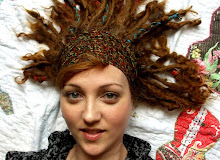A fellow mum I know was given a stroller by her mother-in-law. Her mother-in-law said "I'm going to get the most expensive stroller I can find, because that will be the best one." The mum thought this was ridiculous (though was suitably appreciative of her lovely and free-to-her stroller).
I wonder if our consumerist approach to baby gear has extended into health care and maternity care as well. We buy expensive strollers when many parents would happily just strap their babies to themselves with a piece of cloth. We feel pressured to buy fancy diapers - disposable or cloth - when many parents are satisfied with simple flat or prefold diapers, or eschewing diapers altogether and using elimination communication. The floors of many - I'd propose most - North American homes with an infant are littered with bouncy chairs, Bumbos, playards, swings with music players, infant "gyms", play mats and exersaucers. The very brand names of many of these products encourage us to buy by implying these items will keep our baby safe, educated, entertained, and loved.
Complicated and scientific-sounding infant formulas and baby foods suggest our own milk or homemade food doesn't quite suffice, and may leave our children wanting for space-age nutrients which will grow bigger, better, smarter children. Cribs are marketed as the safest place for an infant, while articles are published likening concientious bed-sharing families with negligent drunks and junkies who inadvertently kill their infants while high or intoxicated in bed with them.
So much time and money and thought has been put into the research and development of these products, and I truly believe that, in the beginning, it was done with the best of intentions in every case. We have come to believe in these products so strongly, though, that I believe we have lost sight of their real purpose, and forgotten that we really are capable of surviving without most or all of them most or all of the time. I would argue that these "parent helpers" have tricked us into believing that our own touch, our own bodies, our own instincts, our own love and attention, fall short of our children's needs. We aren't qualified to parent.
So, too, with maternity care. All of the technology, the medical procedures, the instruments and tests, have become so ubiquitous that we believe they are necessary for a successful pregnancy and delivery. We believe prenatal care is essential to having a healthy baby, when in fact it is a symptom of an environment in which the mother is most likely healthy. A woman who is able to receive prenatal care generally has sufficient access to clean water, nutritious food, housing, and is adequately informed to know how to care for her pregnancy. Listening to a baby's heart tones or taking fetal measurements by ultrasound or palpating a mother's belly doesn't keep the pregnancy healthy, or improve its progress, though it's certainly reassuring to the parents and to the HCP that all is well. Somehow, though, we as a society have come to see such care as essential to having a healthy baby, rather than trusting the healthy body of a healthy mother to properly grow the infant.
Too often I hear doubt in the voices of mothers as they discuss upcoming or past births, saying they "hope" they can give birth, or that it would "be nice" to have a natural birth, while in the next breath saying that they'll try not to be too disappointed should trouble arise. We are warned by everyone around us to prepare our minds for a surgical deliver "in case", to give birth with an obstetrician in a hospital "in case", to agree to a few interventions just "in case". We approach birth without really believing - really and truly believing - that we are physically capable of the act. It isn't surprising, then, that so few women manage to accomplish the task without some sort of alleged assistance, assistance that, very often, leads to a cascade of interventions culminating in caesarean section. We aren't qualified to birth.
The United States has an epidural rate of 90%, an induction or augmentation rate of 85%, and a caesarean rate of nearly 32%. So long as we continue to operate under the premise that we cannot birth, these numbers will not improve. As with any challenging task, the most elemental factor in determining whether one will succeed is believing that one is capable of accomplishing it. So long as we do not believe every woman can birth - and not just those extreme, natural birthing mamas; you know, hippies like me! - we will assuredly be correct.

